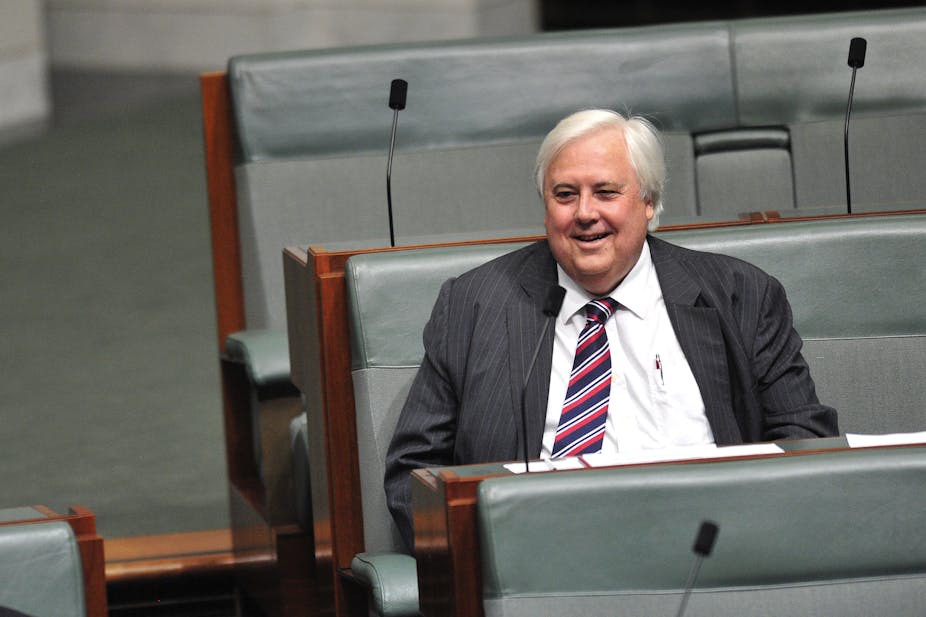Tony Abbott will be in Melbourne this weekend to address the Liberal federal council. The timing is unfortunate.
A Newspoll has just shown the Victorian Coalition would lose badly in an election held now.
Many of its problems are home-grown – the state’s hung parliament has been chaotic. But the Victorian Liberals are also cursing the federal budget, which has over-shadowed its more positive state counterpart.
If the Napthine government is defeated in November, Tony Abbott and Joe Hockey will cop their share of the poisoned arrows.
Rarely does the debate over a federal budget continue so long, or range so widely, as is happening this year. Equally rarely is it so badly handled. The Abbott government seems in a parallel universe – and a never-ending election campaign.
Take its absolute obsession with the repeal of the carbon tax. Monday had Abbott, in fluro jacket, at a cold storage centre in Melbourne. This is ridiculous. The election is over; the next one not in sight. At the start of the sitting week, he should have been in his office, not providing wallpaper for the TV news.
Anyway, the government is very likely misjudging the impact of this issue. People will be glad to get the benefits of the repeal, no doubt, but recent polling indicates their agitation about the tax has declined, while they’ve also become somewhat re-engaged with the climate issue.
For the government, the carbon tax is really all about Labor. The Coalition used to accuse the Labor government of being obsessed with its opponents; in office, it is the same.
Abbott has hoped talking about carbon might overshadow the budget, but right now many voters will be more focused on the hits in store than on future price relief on energy. The latest Nielsen poll found people remain convinced the budget is “unfair”.
The pain is everywhere, and it keeps coming. On Thursday the government announced it is ceasing “the dementia and severe behaviours” supplement.
Labor had under-estimated the number eligible, the government said, and a budgeted $11.7 million for 2013-14 has blown out to $110 million.
Whatever the objective case for killing the supplement, it looks like another (belated, so long after the budget) kick at the vulnerable.
While the government elevated its carbon rhetoric, the post budget process looked messy and neglected.
It only introduced the legislation last week for the raft of freezes and other changes to various payments, despite some being scheduled to come in on July 1. Even if the Senate had been compliant there wouldn’t have been time to deal with them. Debate was gagged in the House. One suggestion was that this saved backbenchers having to defend the unpopular measures.
Treasurer Joe Hockey wasn’t even in the country – he’s been in China for economic talks this week. It was bad to be absent, given the trouble the budget’s in, made worse when the Greens announced they’ll oppose the indexation of fuel excise.
Leader Christine Milne, rejecting the linkage to road spending, cited as one reason for not even entering negotiations that Hockey and Abbott had indicated they took an all-or-nothing approach. While this was basically an excuse – the Greens were all over the place on the issue – the excuse shouldn’t have been available to her.
Ministers have been in “he-man” mode: beat chests and bang on about “debt and deficit”. That not only looks arrogant but doesn’t work in practice when you don’t control the Senate numbers. It’s another manifestation of failing to make a proper transition from electioneering to governing.
DLP senator John Madigan’s frustration at the general approach - public bullying and taking senators granted - broke out in the Senate on Tuesday. After a spray at Hockey for “abuse and derision”, Madigan said: “I challenge the government tonight: if you are serious about getting the nation back on track, then begin a dialogue with the crossbench. Stop using families as a punching bag.
"Let’s sit down and discuss common ground more than just a couple of days out from when we are expected to vote on legislation.”
Asked on Thursday whether the government had been knocking on his door, independent senator Nick Xenophon said: “If they’ve been knocking … I haven’t really heard it”.
Yet when the government knows it has met its match, it quickly shows some flexibility. As soon as Clive Palmer said he’d support repeal of the carbon tax only if there was legislation to ensure consumers received all the benefit, he got an immediate “yes Clive”.
Abbott treated Palmer with disdain a couple of years ago, and has said harsh things since, but when the two met early Thursday in the prime ministerial suite, antagonism was put aside, at least superficially. Palmer admired the paintings by Australian impressionist Arthur Streeton. The office had inquired beforehand to make sure he had his preferred sort of tea. The meeting was very professional.
Abbott has government but Palmer has a Senate veto over his legislation. The Prime Minister took what he could get, knowing he couldn’t get all he wanted. Abbott told Parliament later: “I do look forward to working with the Member for Fairfax and crossbench senators to ensure that all the savings from the abolition of the carbon tax are passed on to consumers”. Contrast earlier dismissals that any extra safeguards were needed.
Presuming all goes smoothly, in July the carbon tax will be repealed. If the Coalition keeps talking about it after that, however, it’s unlikely the public will be listening.
But the unpopular budget will still be in the news, as measures struggle or die in the Senate, and the government will need a lot more than bombast if it is to minimise the revenue loss and the depletion of its political capital even further in the months ahead.

